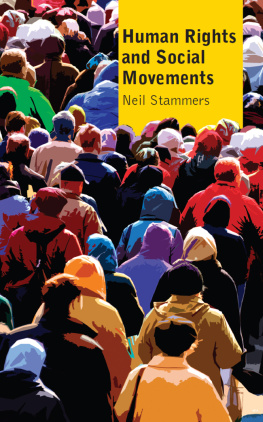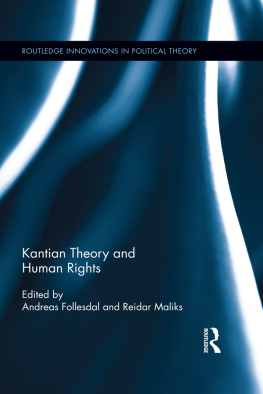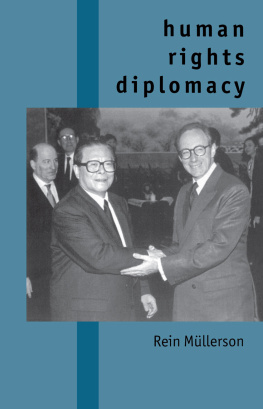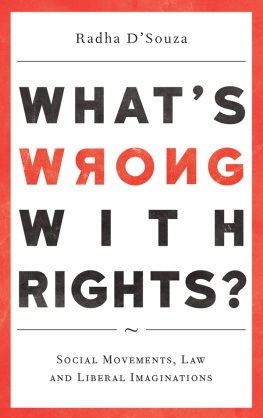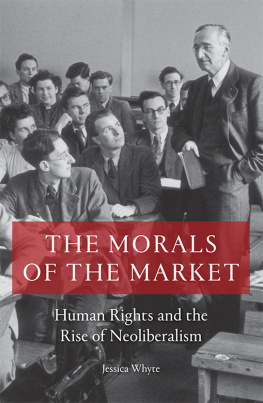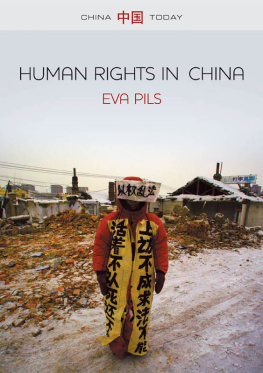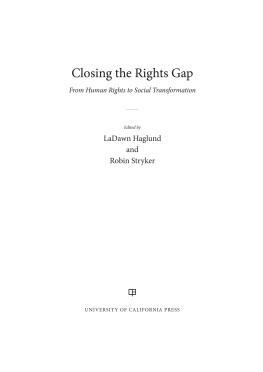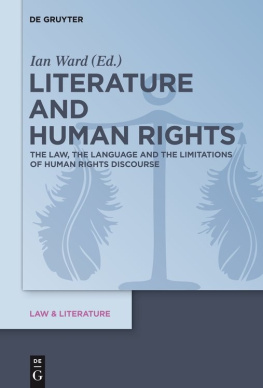Human Rights and Social Movements
Human Rights and
Social Movements
NEIL STAMMERS
First published 2009 by Pluto Press
345 Archway Road, London N6 5AA
175 Fifth Avenue, New York, NY 10010
www.plutobooks.com
Distributed in the United States of America exclusively by Palgrave Macmillan, a division of St. Martins Press LLC, 175 Fifth Avenue, New York, NY 10010
Copyright Neil Stammers 2009
The right of Neil Stammers to be identified as the author of this work has been asserted by him in accordance with the Copyright, Designs and Patents Act 1988.
British Library Cataloguing in Publication Data
A catalogue record for this book is available from the British Library
ISBN 978 0 7453 2912 3 Hardback
ISBN 978 0 7453 2911 6 Paperback
ISBN 978 1 8496 4429 7 PDF eBook
ISBN 978 1 7837 1397 4 Kindle eBook
ISBN 978 1 7837 1396 7 EPUB eBook
Library of Congress Cataloging in Publication Data applied for
This book is printed on paper suitable for recycling and made from fully managed and sustained forest sources. Logging, pulping and manufacturing processes are expected to conform to the environmental standards of the country of origin. The paper may contain up to 70 per cent post-consumer waste.
10 9 8 7 6 5 4 3 2 1
Designed and produced for Pluto Press by
Chase Publishing Services Ltd, Sidmouth, England
Typeset from disk by Stanford DTP Services, Northampton, England Printed and bound in the European Union by
CPI Antony Rowe, Chippenham and Eastbourne
CONTENTS
LIST OF FIGURES
ACKNOWLEDGEMENTS
This book has been a long time in the making and draws much from experiences outside and beyond an academic environment. In particular, many years of working in, and helping to manage, a range of non-governmental organisations concerned with rights, homelessness, welfare and housing in my home town have importantly informed this study. So it is right to begin these acknowledgements with a big thank you to users and colleagues of Brighton Housing Trust, Brighton Law Centre and Brighton Rights Advice Centre.
Though seemingly an age away now, my doctoral research was on civil liberties in Britain during the Second World War and I now realise that the seeds for this study were in some ways sown then, when I was unable to find satisfactory pre-existing theoretical frameworks through which my research could be adequately presented. So thanks to Bob Benewick and John Dearlove for all their support in those early years and subsequently. From 1989 to 2005 I worked in the Politics Department at the University of Sussex. Innumerable discussions with students, friends and colleagues both in the department and the School of Social Sciences and Cultural Studies have helped to shape important aspects of this project. Particular thanks go to students and faculty involved with the graduate programmes in Human Rights and in Social and Political Thought.
While work on this book was under way I was also lucky enough to be involved with the Development Research Centre on Citizenship, Participation and Accountability at the Institute of Development Studies led by John Gaventa. I gained some important insights and met some great people through my involvement with this Centre. Special thanks go to Celestine Nyamu-Musembi, Research Fellow at the Institute, for her consistent encouragement and support for this project. Many others have also offered me inspiration, support and encouragement for this project over the years. Amongst these, Christien van den Anker, Amy Bartholomew, Gurminder Bhambra, Jane Cowan, Marie Dembour, Tony Evans, Anna Grear, Beate Jahn, Zdenek Kavan, Jenneth Parker and Justin Rosenberg all have a special place.
I was also very lucky to have a group of friends and colleagues who were willing to comment on my work as it was going along. Marie Dembour and Zdenek Kavan both unflinchingly waded through draft chapters offering the constructive criticism that is so invaluable and necessary to anyone endeavouring to write. Then Gurminder Bhambra, Emily Haslam, Jenneth Parker, Rob Raeburn, and Zdenek Kavan all went through the completed manuscript providing vital feedback on a range of issues great and small. I must say another word or two about Zdenek Kavan here. With remarkable patience and good grace, especially when I refused to heed his advice, he has sustained his interest and engagement throughout. Truly help beyond words.
Clearly, this book is much better for all the help, comments and advice I have received, but the usual indemnity applies: weaknesses, mistakes and failures are my responsibility alone.
My partner Teresa Harris has seen the process from beginning to end, putting up with some of those strange habits writers engage in in my case, for example, jumping out of bed at an unearthly hour to make a note about some point which seemed so crucial at the time. Despite such habits, she has offered me unswerving support and helped to keep me grounded in the world. The importance of this latter point can hardly be overestimated.
LIST OF ACRONYMS AND ABBREVIATIONS
CRC | Convention on the Rights of the Child |
DFID | Department for International Development |
GA | Globalisation from above |
GB | Globalisation from below |
FoEI | Friends of the Earth International |
INGO | International non-governmental organisation |
(I)NGO | This acronym is used to mean international nongovernmental organisation and/or non-governmental organisation. I use the more familiar acronyms NGO or INGO where I want to be more specific |
LGBT | Lesbian, Gay, Bisexual and Transgender |
OHCHR | Office of the High Commissioner for Human Rights |
MAI | Multilateral Agreement on Investment |
NGO | Non governmental organisation |
NSM | New Social Movement |
TSMO | Transnational social movement organisation |
UNDHR | United Nations Declaration of Human Rights, 1948 |
WSF | World Social Forum |
WTO | World Trade Organisation |
INTRODUCTION
This book explores the analytical significance of the historical link between human rights and social movements, arguing that ordinary people working together in social movements have always been a key originating source of human rights. The approach taken here contrasts starkly with other approaches that claim the meaningful origins of human rights are to be found in philosophy or law. As a consequence, this book also tries to identify the contours of a framework through which the potentials and limits of human rights might be better and more effectively assessed.
Given the millions of words written about human rights worldwide each year, the first instinct of many readers might be to wonder whether anything novel could possibly be said on the subject. Yet, because the significance of the link between human rights and social movements remains largely unexplored in the specialist academic literature on human rights, such an investigation is sorely needed not only for understanding human rights in the world today but also for interrogating other key areas, for example, around power, globalisation, democracy, participation and, last but not least, contemporary forms of institutions and institutionalisation.

